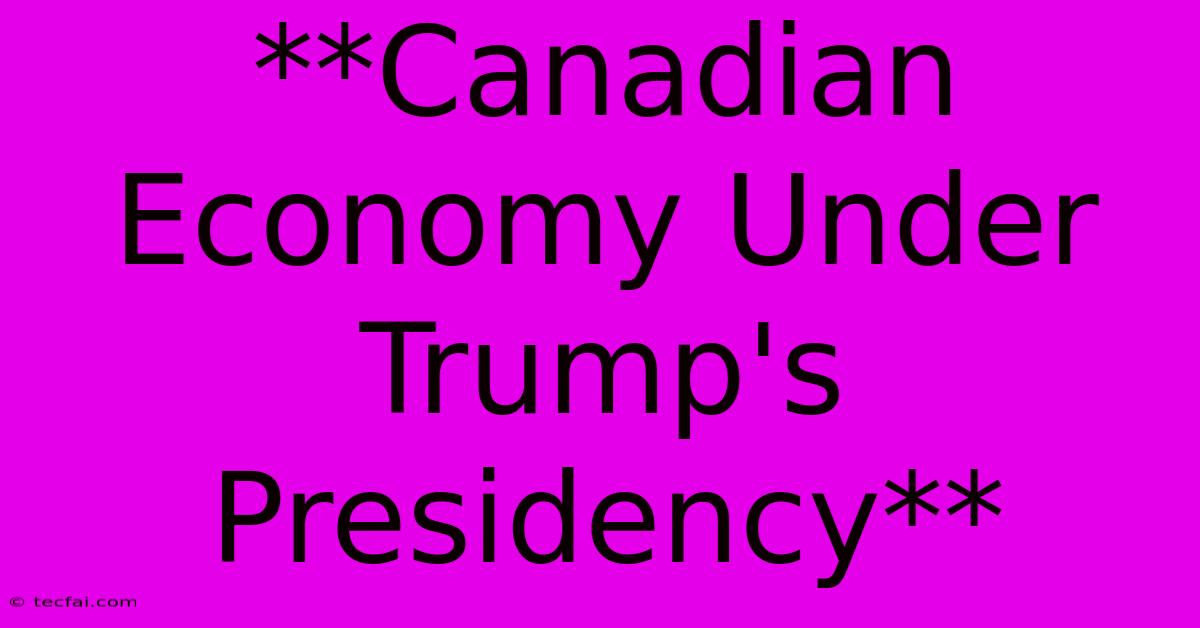**Canadian Economy Under Trump's Presidency**

Discover more detailed and exciting information on our website. Click the link below to start your adventure: Visit Best Website tecfai.com. Don't miss out!
Table of Contents
Navigating Uncertainty: The Canadian Economy Under Trump's Presidency
The election of Donald Trump as President of the United States in 2016 sent shockwaves through the global economy, and Canada was no exception. While the two countries have a long history of intertwined economic fortunes, the unpredictable nature of Trump's policies and rhetoric cast a shadow of uncertainty over the Canadian landscape.
This article delves into the impact of Trump's presidency on the Canadian economy, exploring both the challenges and opportunities that arose during his tenure.
Navigating Trade Wars and Tensions
One of the most immediate impacts of Trump's presidency was his initiation of trade wars, particularly with Canada. The renegotiation of the North American Free Trade Agreement (NAFTA), ultimately resulting in the formation of the United States-Mexico-Canada Agreement (USMCA), created a period of significant uncertainty for Canadian businesses.
Key challenges included:
- Tariffs on Canadian goods: Trump's imposition of tariffs on Canadian aluminum and steel, along with threats of further tariffs on other goods, significantly impacted Canadian industries.
- Trade disputes: The renegotiation process itself was fraught with tension, as both countries engaged in hard-nosed bargaining over various aspects of the trade deal.
- Uncertainty: The constant threats of tariffs and potential trade disruptions created an environment of uncertainty for Canadian businesses, making it difficult to plan for the future.
Despite the challenges, Canada ultimately navigated these trade tensions successfully. The USMCA, while not a perfect agreement, provided much-needed stability and predictability to the bilateral trade relationship.
Adapting to Shifting Trade Flows
While trade tensions dominated the early years of Trump's presidency, the broader shift in global trade patterns also presented both challenges and opportunities for Canada.
Key developments included:
- Diversification of trade: The rise of protectionist policies globally encouraged Canadian businesses to explore new export markets beyond the United States.
- Increased competition: As global trade shifted, Canadian businesses faced increased competition from other countries seeking to fill the void left by American protectionism.
- Growth in new sectors: The shift in global trade patterns created opportunities for Canadian businesses in new sectors, such as renewable energy and technology.
This shift in trade flows, while challenging, ultimately forced the Canadian economy to become more resilient and adaptable.
Navigating Policy Uncertainty
Beyond trade, Trump's unpredictable policies in areas such as energy and immigration also had significant implications for Canada.
Key areas of impact included:
- Energy policy: Trump's support for the oil and gas industry, combined with his withdrawal from the Paris climate agreement, created uncertainty for Canada's clean energy sector.
- Immigration policy: Changes to US immigration policies, including the "travel ban" on citizens from several Muslim-majority countries, impacted Canadian businesses that rely on foreign workers.
- Geopolitical uncertainty: Trump's unpredictable foreign policy and rhetoric increased geopolitical uncertainty, impacting Canadian businesses operating in global markets.
These policy uncertainties, while creating challenges, also spurred Canadian businesses to become more innovative and adaptable to changing global conditions.
A Time of Change and Resilience
The Trump presidency was a period of significant change for the Canadian economy. While the challenges were real and substantial, Canadian businesses demonstrated remarkable resilience and adaptability. The experience has undoubtedly left a lasting impact on the Canadian economy, driving diversification, innovation, and a stronger focus on global markets.
The future of the Canada-US relationship, and its impact on the Canadian economy, remains to be seen. However, the lessons learned during Trump's presidency will undoubtedly shape Canada's economic strategies and priorities in the years to come.

Thank you for visiting our website wich cover about **Canadian Economy Under Trump's Presidency**. We hope the information provided has been useful to you. Feel free to contact us if you have any questions or need further assistance. See you next time and dont miss to bookmark.
Featured Posts
-
Grizzlies Dominate Lakers 131 114 Nov 6
Nov 07, 2024
-
Champions League Barcelona Dominates Red Star 5 2
Nov 07, 2024
-
Trump And Musk A Breakingviews Analysis
Nov 07, 2024
-
Crvena Zvezda Vs Barcelona Lineup And Match Analysis
Nov 07, 2024
-
Safety Alert Metal In Breads Recalled
Nov 07, 2024
